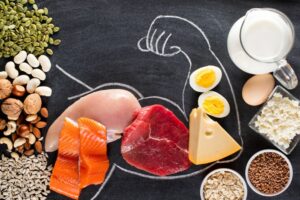From reduced hunger to muscle repair, Nutritional Therapist Jade Lauren Ellis reveals 5 reasons a high protein diet will help you lose fat and keep it off
For a free 20 minute nutrition call to talk about goals, symptoms and expectations click here and quote HEALTHISTA20 for discount code.
Protein is often recommended by nutritionists to keep you feeling fuller for longer and to contribute to successful weight management.
You may have heard of the paleo and low-carbohydrate diets which have become popular over the years for their higher protein intake. They are both associated with optimal weight loss.
Here are 5 reasons why protein can be key for fat loss and weight management:
Reason #1 Protein reduces appetite & hunger
Protein keeps you feeling fuller for longer. With more protein in your diet, you will feel more satiated and satisfied, therefore you are less likely to eat too much.
This will curb a too high calorie intake, therefore facilitating fat loss. Studies have shown that having a breakfast high in protein can help control hunger and may help curb your appetite later in the day.
They have also found that people who consumed extra protein at breakfast had lower blood sugar levels and reduced appetite later in the day compared with those consuming less protein.
a breakfast high in protein can help control hunger
It is for this reason that protein is key for fat loss, due to its ability to reduce hunger levels and therefore calorie intake over the course of the day.
READ MORE: 4 protein myths you need to STOP believing

Reason #2 Protein promotes muscle repair & growth
Nutrition plays an extremely important role in optimising performance during and after exercise. Numerous studies show increased muscle mass when consuming plenty of protein.
The benefits of consuming protein following resistance exercise training have been well-documented, especially as they relate to muscle hypertrophy and function.
giving your body the the building blocks to repair and rebuild muscle
Protein is made up of amino acids, which are essential building blocks for your body. You need them for vital processes such as building proteins, hormones, and neurotransmitters.
When you consume protein after exercise, your are giving your body the the building blocks to repair and rebuild muscle.
You can obtain enough protein through your diet by focusing on dairy, fish, eggs, lean meats, nuts, seeds, soy and legumes.
READ MORE: From exhaustion to muscle aches – 9 supplements to help you recover from exercise faster

Reason #3 Protein supports blood sugar balance
Several studies have shown that protein has an insignificant effect on blood sugar levels. Keeping your blood sugar levels balanced is the key to supporting optimal fat loss and weight management.
Gluconeogenesis is a process in which the body makes sugar through the liver. The building blocks of protein, amino acids, do not increase how fast sugar is released from the liver, therefore eating protein does not affect blood sugar levels.
eating protein does not affect blood sugar levels
Additionally the role of insulin has a positive impact when protein is ingested. Insulin helps amino acids in protein enter the body cells and influence muscle function.
According to several studies, protein has a minimal effect on blood glucose levels if adequate insulin is available.
Reason #4 You burn more calories eating protein than the other macronutrients
The thermic effect of food (TEF), is the amount of energy it takes for your body to digest, absorb and metabolise the food we eat. That means that protein requires more in energy to be processed in your body.
Protein takes the most energy to digest (20-30% of calories in protein go to digesting it). Next is carbohydrates (5-10%) and then fats (0-3%). Higher-protein diets support fat loss because protein digestion and metabolism are energetically expensive processes.
Protein takes the most energy to digest
The TEF represents about 10 per cent of the caloric intake of healthy adults who eat a standard mixed-macronutrient diet, but your actual number will depend on several factors, including your age and the meal timing, and macronutrient composition, meaning the carbs, fat, and protein of your meal.
For example, if you expend 2000 calories in a day, around 200 of those will be burned just from eating food.
READ MORE: Serious about weight loss? 5 non-negotiable rules to live by – part one

Reason #5 Protein keeps you feeling fuller for longer
Protein takes longer to digest than refined carbohydrates and gives your body a feeling of satiety. Protein also changes levels of certain hormones in association with satiety.
Your brain and hormones play an incredible role in weight management; in particular an area called the hypothalamus. The brain processes different types of information when deciding when and how much to eat.
Protein takes longer to digest than refined carbohydrates
When we eat a higher amount of protein, this increases our satiety (appetite reducing) hormones GLP1, peptide YY and cholecystokinin. Your hunger hormone, Ghrelin is reduced.
Therefore by consuming enough protein, we naturally will consume less calories as we will feel fuller for longer, contributing to a healthy weight management and fat loss.
READ MORE: Jillian Michaels says these 11 fat loss tips will help you lose weight and keep it off

Is too much protein a thing?
Yes, it is important to note that consuming too much protein can be potentially detrimental to the kidneys over a long period of time.
It is important to be consuming a range of various protein foods, animal and plant based, mixed with a diet full of whole grains, rich in fibre – fruits and vegetables, and low in processed foods and sugar.
Fat loss is often about the whole picture of the meal, not just an isolated macronutrient. That being said, protein does have many clear benefits which contribute to fat loss and overall weight management.

For a free 20 minute nutrition call to talk about goals, symptoms and expectations click here and quote HEALTHISTA20 for discount code.
Jade Lauren Ellis is a member of the British Association for Nutrition and Lifestyle Medicine (BANT), registered with the Complementary & Natural Healthcare Council (CNHC).
Instagram: @jadeellisnutrition